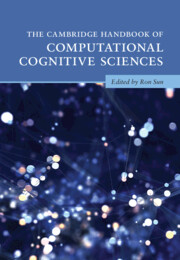Book contents
- The Cambridge Handbook of Computational Cognitive Sciences
- Cambridge Handbooks in Psychology
- The Cambridge Handbook of Computational Cognitive Sciences
- Copyright page
- Contents
- Preface
- Contributors
- Part I Introduction
- Part II Cognitive Modeling Paradigms
- 2 Connectionist Models of Cognition
- 3 Bayesian Models of Cognition
- 4 Symbolic and Hybrid Models of Cognition
- 5 Logic-Based Modeling of Cognition
- 6 Dynamical Systems Approaches to Cognition
- 7 Quantum Models of Cognition
- 8 Constraints in Cognitive Architectures
- 9 Deep Learning
- 10 Reinforcement Learning
- Part III Computational Modeling of Basic Cognitive Functionalities
- Part IV Computational Modeling in Various Cognitive Fields
- Part V General Discussion
- Index
- References
5 - Logic-Based Modeling of Cognition
from Part II - Cognitive Modeling Paradigms
Published online by Cambridge University Press: 21 April 2023
- The Cambridge Handbook of Computational Cognitive Sciences
- Cambridge Handbooks in Psychology
- The Cambridge Handbook of Computational Cognitive Sciences
- Copyright page
- Contents
- Preface
- Contributors
- Part I Introduction
- Part II Cognitive Modeling Paradigms
- 2 Connectionist Models of Cognition
- 3 Bayesian Models of Cognition
- 4 Symbolic and Hybrid Models of Cognition
- 5 Logic-Based Modeling of Cognition
- 6 Dynamical Systems Approaches to Cognition
- 7 Quantum Models of Cognition
- 8 Constraints in Cognitive Architectures
- 9 Deep Learning
- 10 Reinforcement Learning
- Part III Computational Modeling of Basic Cognitive Functionalities
- Part IV Computational Modeling in Various Cognitive Fields
- Part V General Discussion
- Index
- References
Summary
After a brief orientation to logic-based (computational) cognitive modeling, the necessary preliminaries are discussed in this chapter (e.g., what a logic is, and what it is for one to “capture" human cognition are explained). Three “microworlds" or domains that all readers should be comfortably familiar with (natural numbers and arithmetic; everyday vehicles; and residential schools, e.g., colleges and universities) are introduced, in order to facilitate exposition in the chapter. Then the ever-expanding universe U of formal logics, with an emphasis on three categories therein, is given: deductive logics having no provision for directly modeling cognitive states; nondeductive logics suitable for modeling rational belief through time without machinery to directly model cognitive states such as believes and knows; and finally, nondeductive logics that enable the kind of direct modeling of cognitive states absent from the first two types of logic. Then, there follows a focus spcifically on two important aspects of human-level cognition to be modeled in logic-based fashion: the processing of quantification, and defeasible (or nonmonotonic) reasoning. Finally, a brief evaluation of logic-based cognitive modeling is provided, together with some comparison to other approaches to cognitive modeling, and the future of the discipline is considered. The chapter presupposes nothing more than high-school mathematics of the standard sort on the part of the reader.
- Type
- Chapter
- Information
- The Cambridge Handbook of Computational Cognitive Sciences , pp. 173 - 209Publisher: Cambridge University PressPrint publication year: 2023
References
- 1
- Cited by

